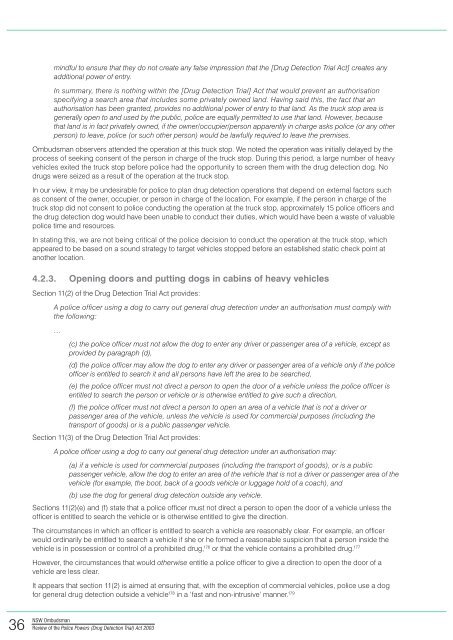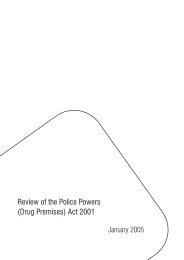Review of the Police Powers (Drug Detection Trial) Act 2003 - NSW ...
Review of the Police Powers (Drug Detection Trial) Act 2003 - NSW ...
Review of the Police Powers (Drug Detection Trial) Act 2003 - NSW ...
You also want an ePaper? Increase the reach of your titles
YUMPU automatically turns print PDFs into web optimized ePapers that Google loves.
mindful to ensure that <strong>the</strong>y do not create any false impression that <strong>the</strong> [<strong>Drug</strong> <strong>Detection</strong> <strong>Trial</strong> <strong>Act</strong>] creates any<br />
additional power <strong>of</strong> entry.<br />
In summary, <strong>the</strong>re is nothing within <strong>the</strong> [<strong>Drug</strong> <strong>Detection</strong> <strong>Trial</strong>] <strong>Act</strong> that would prevent an authorisation<br />
specifying a search area that includes some privately owned land. Having said this, <strong>the</strong> fact that an<br />
authorisation has been granted, provides no additional power <strong>of</strong> entry to that land. As <strong>the</strong> truck stop area is<br />
generally open to and used by <strong>the</strong> public, police are equally permitted to use that land. However, because<br />
that land is in fact privately owned, if <strong>the</strong> owner/occupier/person apparently in charge asks police (or any o<strong>the</strong>r<br />
person) to leave, police (or such o<strong>the</strong>r person) would be lawfully required to leave <strong>the</strong> premises.<br />
Ombudsman observers attended <strong>the</strong> operation at this truck stop. We noted <strong>the</strong> operation was initially delayed by <strong>the</strong><br />
process <strong>of</strong> seeking consent <strong>of</strong> <strong>the</strong> person in charge <strong>of</strong> <strong>the</strong> truck stop. During this period, a large number <strong>of</strong> heavy<br />
vehicles exited <strong>the</strong> truck stop before police had <strong>the</strong> opportunity to screen <strong>the</strong>m with <strong>the</strong> drug detection dog. No<br />
drugs were seized as a result <strong>of</strong> <strong>the</strong> operation at <strong>the</strong> truck stop.<br />
In our view, it may be undesirable for police to plan drug detection operations that depend on external factors such<br />
as consent <strong>of</strong> <strong>the</strong> owner, occupier, or person in charge <strong>of</strong> <strong>the</strong> location. For example, if <strong>the</strong> person in charge <strong>of</strong> <strong>the</strong><br />
truck stop did not consent to police conducting <strong>the</strong> operation at <strong>the</strong> truck stop, approximately 15 police <strong>of</strong>ficers and<br />
<strong>the</strong> drug detection dog would have been unable to conduct <strong>the</strong>ir duties, which would have been a waste <strong>of</strong> valuable<br />
police time and resources.<br />
In stating this, we are not being critical <strong>of</strong> <strong>the</strong> police decision to conduct <strong>the</strong> operation at <strong>the</strong> truck stop, which<br />
appeared to be based on a sound strategy to target vehicles stopped before an established static check point at<br />
ano<strong>the</strong>r location.<br />
4.2.3. Opening doors and putting dogs in cabins <strong>of</strong> heavy vehicles<br />
Section 11(2) <strong>of</strong> <strong>the</strong> <strong>Drug</strong> <strong>Detection</strong> <strong>Trial</strong> <strong>Act</strong> provides:<br />
A police <strong>of</strong>ficer using a dog to carry out general drug detection under an authorisation must comply with<br />
<strong>the</strong> following:<br />
…<br />
(c) <strong>the</strong> police <strong>of</strong>ficer must not allow <strong>the</strong> dog to enter any driver or passenger area <strong>of</strong> a vehicle, except as<br />
provided by paragraph (d),<br />
(d) <strong>the</strong> police <strong>of</strong>ficer may allow <strong>the</strong> dog to enter any driver or passenger area <strong>of</strong> a vehicle only if <strong>the</strong> police<br />
<strong>of</strong>ficer is entitled to search it and all persons have left <strong>the</strong> area to be searched,<br />
(e) <strong>the</strong> police <strong>of</strong>ficer must not direct a person to open <strong>the</strong> door <strong>of</strong> a vehicle unless <strong>the</strong> police <strong>of</strong>ficer is<br />
entitled to search <strong>the</strong> person or vehicle or is o<strong>the</strong>rwise entitled to give such a direction,<br />
(f) <strong>the</strong> police <strong>of</strong>ficer must not direct a person to open an area <strong>of</strong> a vehicle that is not a driver or<br />
passenger area <strong>of</strong> <strong>the</strong> vehicle, unless <strong>the</strong> vehicle is used for commercial purposes (including <strong>the</strong><br />
transport <strong>of</strong> goods) or is a public passenger vehicle.<br />
Section 11(3) <strong>of</strong> <strong>the</strong> <strong>Drug</strong> <strong>Detection</strong> <strong>Trial</strong> <strong>Act</strong> provides:<br />
A police <strong>of</strong>ficer using a dog to carry out general drug detection under an authorisation may:<br />
(a) if a vehicle is used for commercial purposes (including <strong>the</strong> transport <strong>of</strong> goods), or is a public<br />
passenger vehicle, allow <strong>the</strong> dog to enter an area <strong>of</strong> <strong>the</strong> vehicle that is not a driver or passenger area <strong>of</strong> <strong>the</strong><br />
vehicle (for example, <strong>the</strong> boot, back <strong>of</strong> a goods vehicle or luggage hold <strong>of</strong> a coach), and<br />
(b) use <strong>the</strong> dog for general drug detection outside any vehicle.<br />
Sections 11(2)(e) and (f) state that a police <strong>of</strong>ficer must not direct a person to open <strong>the</strong> door <strong>of</strong> a vehicle unless <strong>the</strong><br />
<strong>of</strong>ficer is entitled to search <strong>the</strong> vehicle or is o<strong>the</strong>rwise entitled to give <strong>the</strong> direction.<br />
The circumstances in which an <strong>of</strong>ficer is entitled to search a vehicle are reasonably clear. For example, an <strong>of</strong>ficer<br />
would ordinarily be entitled to search a vehicle if she or he formed a reasonable suspicion that a person inside <strong>the</strong><br />
vehicle is in possession or control <strong>of</strong> a prohibited drug, 176 or that <strong>the</strong> vehicle contains a prohibited drug. 177<br />
However, <strong>the</strong> circumstances that would o<strong>the</strong>rwise entitle a police <strong>of</strong>ficer to give a direction to open <strong>the</strong> door <strong>of</strong> a<br />
vehicle are less clear.<br />
It appears that section 11(2) is aimed at ensuring that, with <strong>the</strong> exception <strong>of</strong> commercial vehicles, police use a dog<br />
for general drug detection outside a vehicle 178 in a ‘fast and non-intrusive’ manner. 179<br />
36<br />
<strong>NSW</strong> Ombudsman<br />
<strong>Review</strong> <strong>of</strong> <strong>the</strong> <strong>Police</strong> <strong>Powers</strong> (<strong>Drug</strong> <strong>Detection</strong> <strong>Trial</strong>) <strong>Act</strong> <strong>2003</strong>

















